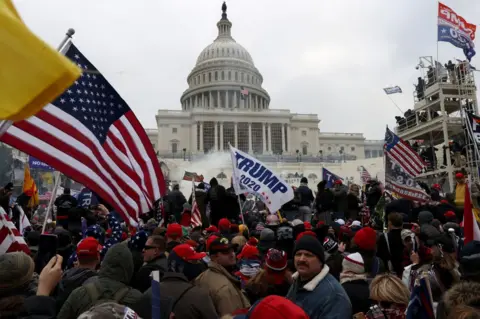Capitol riot: What does a deadly day mean for Trump's legacy?

This is how the Trump presidency ends. Not with a whimper, but with a bang.
For weeks, Donald Trump had been pointing to 6 January as a day of reckoning. It was when he told his supporters to come to Washington DC, and challenge Congress - and Vice-President Mike Pence - to discard the results of November's election and keep the presidency in his hands.
On Wednesday morning, the president and his warm-up speakers set the whirlwind in motion.
Rudy Giuliani, the president's personal lawyer, said the election disputes should be resolved through "trial by combat".
Donald Trump Jr, the president's oldest son, had a message to members of his party who would not "fight" for their president.
"This isn't their Republican Party anymore," he said. "This is Donald Trump's Republican Party."
Then the president himself encouraged the growing crowd, which had chanted "stop the steal" and "bullshit" at the president's prompting, to march the two miles from the White House to the Capitol.
"We will never give up. We will never concede," the president said. "Our country has had enough. We will not take it anymore."

As the president was concluding his remarks, a different kind of drama was playing out within the Capitol itself, as a joint session of Congress prepared to tabulate the state-by-state results of the election.
First, Pence - disregarding the president's urging to throw out the results from contested states - released a statement that he did not have such powers and his role was "largely ceremonial".
Then Republicans issued their first challenge, to Arizona votes, and the House and Senate began their separate deliberations on whether to accept Joe Biden's victory there.
The House proceedings were raucous, with both sides cheering as their speakers made their remarks.
"The oath that I took this past Sunday to defend and support the Constitution makes it necessary for me to object to this travesty," said newly elected Congresswoman Lauren Boebert, who had recently made headlines for insisting that she would carry a handgun with her in Congress. "I will not allow the people to be ignored."
 Getty Images
Getty ImagesIn the Senate, the debate was taking on a different tone. Senate Majority Leader Mitch McConnell, dressed in the kind of dark suit and tie that befits a funeral, was coming to bury Donald Trump, not praise him.
"If this election were overturned by mere allegations from the losing side, our democracy would enter a death spiral," McConnell said. "We'd never see the whole nation accept an election again. Every four years would be a scramble for power at any cost."
The Kentucky senator, who will become the Senate minority leader as a result of his party's two recent defeats in Georgia, said that the chamber was designed to "stop short-term passions from boiling over and melting the foundations of our republic".
His words were practically still hanging in the air when the passions outside the Capitol boiled over, and the Trump supporters, perhaps inspired by the earlier speeches, stormed the building. They swamped the insufficient security in place and brought the proceedings to a grinding halt, as lawmakers, staff and media rushed to find shelter from the rioters.
The drama unfolded in fits and starts. Television cameras broadcast images of protesters dancing and waving flags on the steps of the Capitol. Photos and snippets popped up on social media of rioters inside the building, attempting to break into the legislative chambers and posing in the offices of elected legislators; of security officers, guns drawn in the House of Representatives, behind barricaded doors.

In Wilmington, Delaware, President-elect Joe Biden scrapped a planned speech on the economy and condemned what he called an "insurrection" in Washington.
"At this hour our democracy is under unprecedented assault unlike anything we've seen in modern times," he said. "An assault on the citadel of liberty, the Capitol itself."
He concluded his short remarks with a challenge to Trump: to go on national television to condemn the violence and "demand an end to this siege".
Minutes later, Trump would offer his message to the nation - but it was not the one Biden suggested.
Instead, sandwiched between his now familiar complaints about the election being "stolen", he told his supporters "to go home, we love you, you're very special".
It was the kind of kid gloves way the president has routinely responded to transgressions from his supporters - whether it was their violent treatment of protesters at his rallies, the "very fine people on both sides" statement after the clashes at a white supremacist rally in Charlottesville or his "stand back and stand by" message to the far-right Proud Boys group during the first debate with Biden.
Trump's tweet, and two subsequent ones which also praised his supporters, were flagged and then removed by Twitter, which took the unprecedented step of locking the president's account for 12 hours. Facebook followed suit, banning Trump for a full day.
For the first time in his presidency, for the first time in his long, intimate relationship with social media, Donald Trump had been silenced.

If this is the "at long last, have you left no sense of decency" moment for Donald Trump, it arrives as they're cleaning up blood and broken glass in the US Capitol.
As the afternoon stretched into the evening, and police finally secured the US Capitol, a growing chorus of voices - from the left and right - condemned the violence. It was not surprising that Democrats, like soon-to-be Senate Majority Leader Chuck Schumer, laid the riots at the feet of the president.
"January 6 will go down as one of the darkest days in American history," he said. "A final warning to our nation of the consequences of the demagogic president, the people who enable him, the captive media that parrot his lies and the people who follow him as he attempts to push America to the brink of ruin."
More noteworthy, however, were the Republicans who followed suit.
"We just had a violent mob assault the Capitol in an attempt to prevent those from carrying out our Constitutional duty," tweeted Congresswoman Lynne Cheney, a frequent Republican critic of the president's. "There is no question that the president formed the mob, the president incited the mob, the president addressed the mob."
The condemnations were not limited to Trump's reliable intraparty critics, however. Senator Tom Cotton of Arkansas, who frequently sides with the president, also spoke out.
"It's past time for the president to accept the results of the election, quit misleading the American people, and repudiate mob violence," he said.
First Lady Melania Trump's Chief of Staff Stephanie Grisham and Deputy White House Press Secretary Sarah Matthews both resigned in protest, and there are reports that more administration officials will head for the exits in the next 24 hours.
CBS has reported that Trump administration Cabinet officials are discussing the 25th amendment to the US constitution, which outlines how the vice-president and a majority of the Cabinet can temporarily remove a president from office.
Whether Pence and the Cabinet act or not, Trump's presidency will be over in just two weeks. At that point, Republican Party leaders will have to grapple with a future where it has lost control of the Congress and the White House and has a former president whose reputation is badly tarnished but who still has strong sway over a sizeable segment of the party's base.
Wednesday's events could presage a pitched battle for the direction of the party, as conservatives within the party attempt to wrest control away from Trump and his loyalists. McConnell, given his remarks earlier in the day, appears willing to chart such a course. Others, like Utah Senator Mitt Romney, a former Republican presidential nominee, may also take a leading role.
They will be challenged by others within the party who may be more interested in laying claim to Trump's populist mantle. It was notable that Josh Hawley of Missouri, the first senator to announce he would object the results of the election in the Senate, did not step away from his challenge even after the Senate reconvened following the violence in the Capitol.
Crisis can bring political opportunity, and there are many politicians who will not hesitate to use it to gain advantage.
Meanwhile, Trump - for now - is still in power. And while he may be chastened, he may be sitting in the White House residence watching television temporarily without his social media outlet, he will not be silent for long.
And once he decamps for his new Florida home, he could begin making plans to settle scores and, perhaps, someday return to power and rebuild a legacy that, for the moment, lies in tatters.
